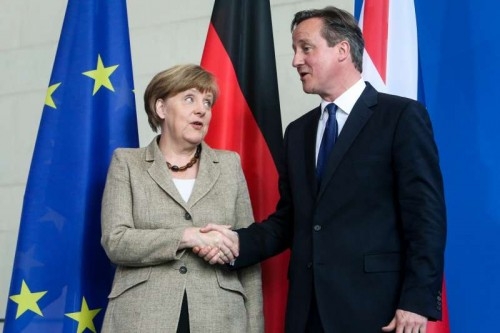British Prime Minister David Cameron tried to head off a mounting Tory Eurosceptic backlash today by blaming the media for the chaos and confusion over his EU referendum policy.

Speaking at the G7 summit in Germany, the Prime Minister said that there had been ‘misinterpretation’ of his remarks suggesting ministers would have to resign if they wanted to campaign for Britain’s exit from the EU reported Huffington Post.
In an extraordinary press conference, Mr Cameron said that he couldn’t sometimes remember what his previous line on the issue had been because the BBC’s Andrew Marr had interrupted him so often.
Pleading with reporters to ‘take this stage by stage, step by step’, he refused to speculate on what would happen to ministers who want to join a ‘No’ campaign if he failed to get what they wanted from Brussels.
Mr Cameron had sparked Tory backbench anger last night when he declared ‘ ‘if you want to be part of the government’ ministers would have to share his view that the changes would lead to a ‘Yes’ vote in the 2017 referendum.
“I have always said what I want is an outcome for Britain that keeps us in a reformed EU. But I have also said we don’t know the outcome of these negotiations, which is why I have always said I rule nothing out.
Therefore it would be wrong to answer hypothetical questions. I know that can be frustrating. I know you want to jump to the end of the process and have all the questions answered now about the end of that process. That is not going to be possible. You are going to have to take this stage by stage, step by step and you will get the answers.”
Mr Cameron even suggested that his party was right behind him, despite a backlash from senor Conservatives such as David Davis, Andrew Mitchell and backbench 1922 Committee chairman Graham Brady.
“There’s real unity behind the renegotiate and referendum strategy, which is right for the country, which is right for the country,” he claimed.